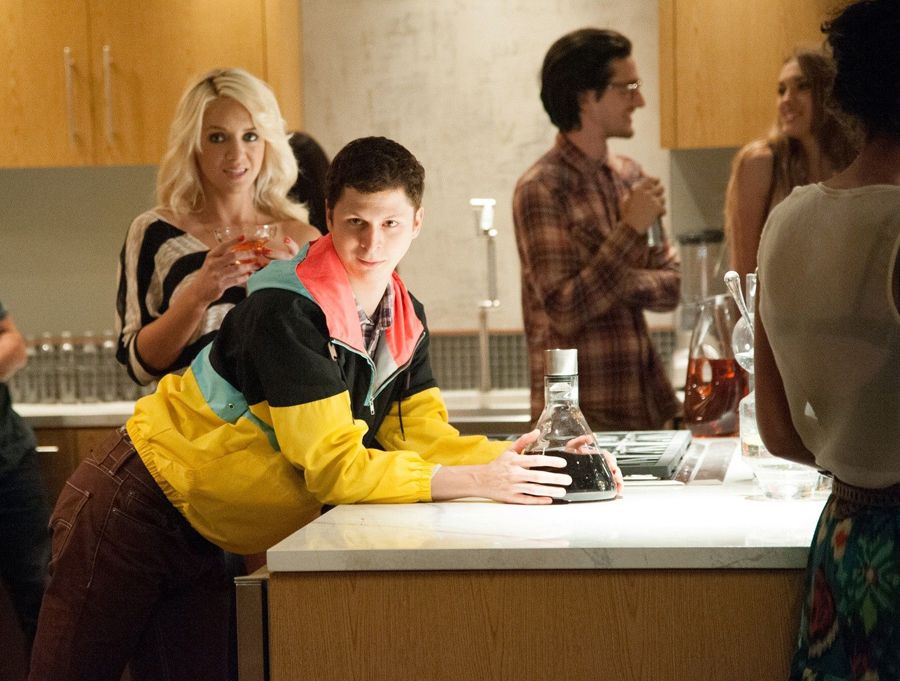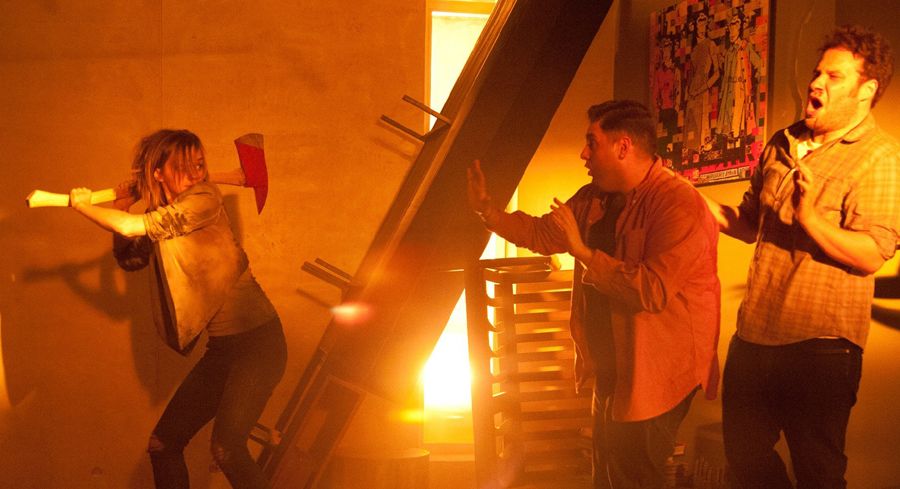Truly great Hollywood satires are in painfully short supply, but This Is the End gets a lot closer to greatness than most.
A raucous comedy that ostensibly documents what Seth Rogen and his famous friends would do if they were trapped together during a bona fide apocalyptic event, the actor’s co-directing debut (alongside longtime friend and collaborator Evan Goldberg) fearlessly attacks movie-star hubris with a specificity that few Hollywood-insider portraits dare. And even if Rogen and his pals are truly nothing like the versions of themselves they portray on screen, This Is the End takes celebrity self-indulgence just seriously enough that audiences can either subscribe to its redemptive message or dismiss it as Hollywood’s most self-reflexive – if also funniest -- wish-fulfillment scenario ever.
Playing himself, as are all of the other actors in the film, Rogen picks up Jay Baruchel from the airport for a much-needed reunion between the two friends, whose lives in and out of Tinseltown have caused a strain on their relationship. Despite initial plans to stay in, smoke weed and play video games alone, Rogen convinces Baruchel to join him for a party at James Franco’s house, where they also find Craig Robinson, Jonah Hill, singer Rihanna and an out-of-control Michael Cera among many others. But during a run to the store for snacks, Rogen and Baruchel witness the first signs of an impending catastrophe, which quickly intensifies when a sinkhole in Franco’s yard deposits the majority of his houseguests in a fiery abyss.
Fortifying themselves inside Franco’s modernist palace, Rogen, Baruchel, Hill, Robinson and Franco gather what little food remains and try to survive. But when party crasher Danny McBride turns up, pitting them against one another and ignoring their efforts to ration supplies, friendships are tested as they’re confronted by the prospect that what each of them did to achieve stardom may be precisely the reason they’re still stuck in a literal Hell on Earth.
Before settling into his current position as one of the industry’s top purveyors of sweetly puerile comedies, Rogen actually wanted to make sweeping, action-oriented blockbusters. So it comes as little surprise that his directorial debut offers a chocolate-and-peanut-butter combination of the two, arranging surprisingly deft set pieces in between characteristically buoyant improv showdowns, and occasionally, heartfelt bromantic exchanges. That he pulls off those bigger sequences comes as less of a surprise than that he somehow makes it all work together. Its disjointed, chapter-like structure feels more a product of necessity than design -- and one to the benefit of viewers, as they’ll likely need to catch their breath between orgiastic fits of laughter.
But where past Hollywood satires fired broad shots across the industry’s bow, Rogen’s depiction of the venal, petty, insecure self-aggrandizement of actors and A-listers strikes its target with deadly accuracy. Precisely how much these particular actors are like their on-screen characterizations is unimportant, but that Rogen and Goldberg deconstruct real and believable personalities – however exaggerated for comic effect – speaks both to the industry’s acceptance of terrible behavior, and our fascination with it both behind the scenes and in public. Hill’s version of himself speaks best to this: Effortlessly condescending as he tries to be a “supportive” friend to outsider Baruchel, he captures both an actor’s aptitude for falsehood and the disingenuous intimacy of celebrity friendships. If this seems judgmental, it isn’t meant to be; rather, the film’s perceptive take on these facile, unstable relationships is merely a reflection of many young-adult interactions, except in this case writ large against the backdrop of multimillion-dollar success and viewed through the media’s unblinking eye.
That said, its psycho-analytical look at Hollywood mostly feels imperceptible given the nonstop barrage of jokes that the ensemble launches at one another throughout the film, both in grand proportions and asides. An exorcism scene, for example, preys upon movie clichés, personality types and casual observations simultaneously, never descending into full-fledged parody, nor digressing so far into improvisation that the film’s narrative thread is lost. But there are scenes in this film that rival the funniest in virtually any and all of its stars’ careers, primarily because everyone involved is completely willing to make him- or herself look like a jackass. By comparison, Tropic Thunder aimed at “types” that virtually none of its stars resembled, but here, Rogen, Baruchel, Hill and Franco are making themselves look bad. As a matter of perception or actuality, they know who they are and are secure enough to generate real laughs at their own expense.
While subsequent viewings will no doubt unearth even more jokes that were missed while viewers wheeze through its more conspicuous set-ups, This Is the End works equally well as a bona fide disaster movie and a comical portrait of creature-comfort survivalism. Turning cult-of-personality arrogance against the petulance of self-preservation, Rogen and Goldberg have beautifully merged the sensibilities of two genres for which they show enormous affinity, satisfying the demands of both simultaneously while deconstructing them individually. But ultimately, This Is the End is an ouroboros of meta-moviemaking that manages to go down so tastily that we hope it never reaches its tail. In fact, its greatest accomplishment may be making complete and hilarious fun of Hollywood’s impulse to make movies about the end of the world, and managing to be the only one of them that might warrant a sequel.
This Is the End opens today nationwide.



